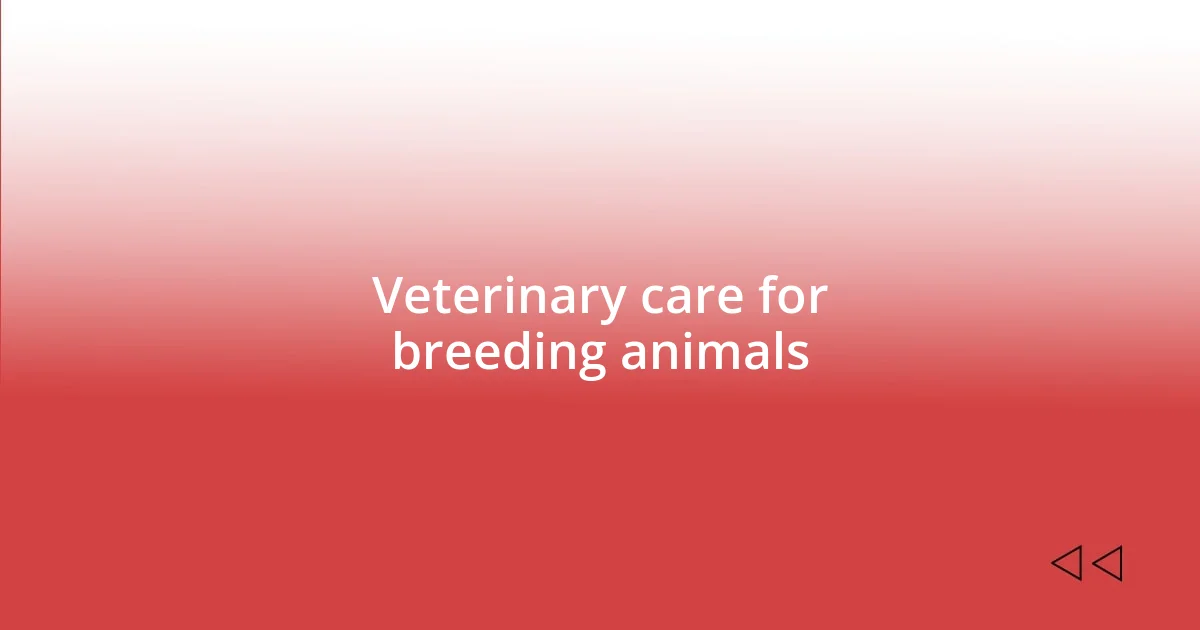Key takeaways:
- Balancing genetics with health is crucial; prioritize health to avoid hereditary diseases and ensure well-being over aesthetics.
- Nutrition significantly impacts breeding success; focus on high-quality protein, essential fatty acids, vitamins, and hydration for optimal health of breeding stock and offspring.
- Regular veterinary care and monitoring are essential; health assessments and collaboration with veterinarians can uncover hidden issues and guide effective breeding health plans.

Understanding breeding challenges
Breeding challenges can often feel overwhelming, especially when you’re trying to balance the desire for exceptional traits with the responsibility of maintaining health. I remember the early days of my own breeding journey when I naively focused solely on lineage without considering the complexities of genetic combinations. Have you ever found yourself so excited about potential offspring that you overlooked a subtle, yet vital, health concern?
One of the biggest hurdles in breeding is dealing with hereditary diseases. It’s heartbreaking to see a beloved animal suffer from conditions that could have been mitigated through careful selection. I once had a litter that possessed stunning looks but was plagued by issues that were entirely preventable. This experience taught me that aesthetics should never outweigh the wellbeing of the animal.
Another challenge involves the environment in which breeding takes place. Factors like stress, diet, and socialization directly influence not just breeding success but also the health of the offspring. Reflecting on my own experiences, I’ve learned to create a nurturing environment that promotes both growth and wellness. Have you considered how your breeding practices can impact the emotional and physical vitality of your animals? It’s essential to recognize that a holistic approach is key to successful breeding.

Importance of health in breeding
Maintaining health during breeding is crucial because any neglect can lead to serious consequences for both the parent animals and their offspring. I vividly remember when I prioritized genetic traits over health; it ended in a devastatingly sick puppy that shattered my heart. This experience taught me the invaluable lesson that health should always come first. After all, what good are those beautiful, award-winning traits if the animal struggles to thrive?
When considering the health of breeding stock, I’ve found that regular veterinary check-ups and genetic testing can make all the difference. I once had a breeding pair that looked perfect on paper, but one of them revealed a hidden genetic condition. This revelation changed my entire approach. Now, health screenings are non-negotiable for me; they ensure that I’m contributing positively to the breed while also giving my animals the best chance at a healthy life.
Ultimately, strong health practices not only protect individual animals but also enhance the reputation of breeding programs. I learned this firsthand when I made health a top priority and noticed a significant boost in my reputation among fellow breeders. People began to appreciate my commitment to wellness, which created a positive ripple effect for my future breeding efforts. Focusing on health opens doors and fosters respect—an invaluable asset in the world of breeding.
| Health Focus | Important Outcomes |
|---|---|
| Genetic Testing | Identification of hereditary diseases |
| Regular Veterinary Check-ups | Proactive management of overall health |
| Environment Management | Improved stress levels and socialization |
| Balanced Diet | Optimal growth and development for offspring |

Nutrition tips for breeding success
When it comes to breeding, nutrition plays a pivotal role in ensuring both the breeding stock and their future offspring thrive. I remember the nervous energy I felt during my first breeding cycle, constantly questioning whether I was providing the right nutrients. I narrowed my focus on the breed-specific dietary needs, and it was a game changer. For instance, I learned that adequate protein levels are essential for developing strong muscles in pups and keeping the mothers in optimal condition.
Here are some essential nutrition tips that have greatly influenced my breeding success:
- High-Quality Protein: Ensure the diet includes lean meats, fish, or specific breeding formulas that provide essential amino acids.
- Essential Fatty Acids: Incorporate omega-3 and omega-6 fatty acids for healthy skin, coat, and overall vitality.
- Vitamins and Minerals: Use fortified foods or supplements to support reproductive health and fetal development.
- Caloric Needs: Adjust caloric intake based on the mother’s stage—higher during pregnancy and lactation to support her energy needs.
- Hydration: Always provide fresh water, as proper hydration is vital for digestion and nutrient absorption.
I can’t emphasize enough how vital it has been to keep a close eye on nutritional balance. I once encountered a situation where I underestimated the importance of a well-rounded diet during the late stages of pregnancy, only to see the effects manifest in the pups’ early growth. The joy of a healthy litter is undeniable, and having nourished my breeding stock properly made all the difference in their vitality and happiness.

Managing stress during breeding
Managing stress during breeding is an often overlooked but critical aspect of ensuring a successful outcome. I remember a time when my female was due to whelp but was clearly anxious and restless. I never appreciated how much her environment could impact her stress levels until I made some changes. I implemented soothing music and created a quiet birthing area, which not only calmed her but also allowed her to focus on the important task ahead.
I’ve also found that maintaining a consistent routine during breeding can significantly reduce anxiety for both the breeding stock and myself. When I introduced a structured feeding and exercise schedule, it was amazing to see how quickly the animals adapted. I mean, do you think a consistently predictable environment helps in alleviating stress? From my experience, the answer is a resounding yes. It creates a sense of security that allows them to thrive.
Furthermore, I’ve learned to stay attuned to my animals’ emotional states. There was a moment when I noticed my male became overly hyper during the breeding period. Instead of letting that energy spiral out of control, I channeled it by providing appropriate outlets like playtime or puzzle toys. Not only did it keep him engaged, but it also contributed to a healthier breeding cycle. It’s all about listening to them—isn’t it interesting how our animals communicate their needs so clearly?

Monitoring health during the process
Monitoring the health of both the breeding stock and their offspring is something I take very seriously. During one breeding cycle, I learned just how critical regular health checks can be. I made it a routine to observe for signs of distress or illness, such as unusual behavior or changes in appetite, and I was amazed at how early detection made a world of difference. It’s a reminder that being proactive rather than reactive is key to ensuring a healthy breeding process.
I’ve also found that maintaining a health diary is an invaluable tool. Tracking important details—like vaccinations, deworming schedules, and any unusual symptoms—has strengthened my understanding of each animal’s health. Let me tell you, there was a time when I overlooked a minor cough in one of my females. By keeping detailed notes, I caught it early this time around and had the vet assess her, preventing a minor issue from becoming a significant setback. Does your breeding protocol include keeping records? If not, I strongly recommend it; it’s a game changer for staying on top of health management.
Lastly, I cannot stress enough the importance of veterinary support throughout the breeding process. I remember the peace of mind I felt knowing that I had a knowledgeable vet on call for advice during pregnancy. Regular prenatal check-ups allowed for monitoring of any health concerns that might arise, and each visit equipped me with tailored advice. It’s always reassuring to have that professional input, isn’t it? I believe that fostering a strong relationship with a vet ensures not only the wellbeing of the breeding stock but also the future generations.

Veterinary care for breeding animals
Veterinary care is pivotal when it comes to the health of breeding animals. I vividly recall a time when one of my females had trouble conceiving. It wasn’t until I consulted my veterinarian that I learned about potential hormonal imbalances affecting fertility. That experience reinforced my belief that having a trusted vet not only provides clarity but can make all the difference in the breeding process.
Regular health assessments play a crucial role, and I’ve seen the benefits first-hand. After setting up a routine of biweekly vet visits for my breeding stock, I noticed a significant improvement in their overall health and well-being. Those check-ups often revealed issues that I would never have spotted myself—like subtle signs of dental disease in a male that could have impacted his breeding capability. Isn’t it incredible how a simple visit can uncover underlying health issues?
On a more emotional note, I cherish the moments when my vet would take the time to explain medical concerns in layman’s terms. One particular visit, she explained the importance of nutrition for pregnant females in a way that resonated with me deeply. Hearing her articulate this while examining my animals made me feel a renewed sense of responsibility. It truly emphasizes how vital that partnership is; having that expert guidance helps us make informed decisions that ensure our animals thrive, doesn’t it?

Creating a breeding health plan
Creating a breeding health plan is like laying the foundation for a successful breeding journey. In my experience, I’ve found that starting with a comprehensive assessment of the breeding stock is essential. Before I even think about breeding, I ensure that each animal undergoes a thorough health evaluation. This examination often includes blood tests, body condition scoring, and vaccination checks. I remember a breeding cycle where a simple blood test revealed a deficiency in one of my females, allowing us to address it before it impacted her ability to conceive.
When developing the health plan, I prioritize individualized care for each animal. Personal observations are invaluable here; for instance, I take note of each animal’s unique temperament and health history. I once had a male who thrived on a high-protein diet but struggled with stress during mating. Adjusting his environment significantly improved his performance. Isn’t it fascinating how minor tweaks can unleash an animal’s potential? This attention to detail in my breeding health plan ensures that I cater to the specific needs of each animal.
Finally, I believe that collaborating with my vet to create this health plan is crucial. During one consult, my vet encouraged me to integrate supplements into my routine to enhance fertility, and I was amazed by the results. Seeing my animals flourish with this holistic approach reinforced my belief in teamwork. Have you ever thought about how vital it is to share insights with your vet? Together, we crafted a plan tailored to my situation, combining traditional care with innovative practices. I find that this blend often leads to the best outcomes in both health and breeding success.















